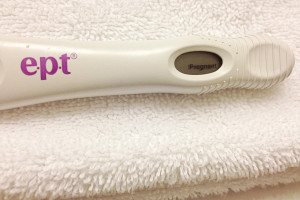Am I Pregnant?
When you are trying for a baby, every twitch, twinge, and wiggle can make you hopeful. It is next to impossible to not analyze everything that is happening in your body as a possible sign.
The truth is that the best way to confirm a pregnancy is by seeing your doctor and having a blood test, done twice, three days apart. What this does is measure your hCG (Human chorionic gonadotropin) levels. This is a hormone that is produced by the body when an embryo implants in the uterus. In most typical pregnancies, the hCG levels will double every 72 hours. By testing three days apart, your doctor can determine if your hormone levels are appropriate for where you are in your cycle.
The second most reliable way to confirm a pregnancy is by taking a home pregnancy test. These at-home tests will measure the level of hCG in your urine. It takes a higher concentration of hormone for these tests to register a pregnancy, which is why home pregnancy tests are most reliable two weeks after suspected ovulation, or at the time of your missed period.
If it is too early to test, or you are the type of person who wants to know all the symptoms, there are other things you can look for that may indicate pregnancy. Keep in mind that you may have all, or none, of these and still be pregnant. You may have all of these and not be pregnant.
Tender breasts: rising hormone levels may make your breasts, particularly your nipples, extremely sensitive. This symptom often lasts throughout the first trimester and can make clothing, intercourse, or nursing an older child particularly uncomfortable. Some people find that wearing reusable (and soft!) breast pads can help to make clothing more comfortable.
Frequent bathroom breaks: are you heading to bathroom more often? You might be peeing for two! During pregnancy your blood volume increases (this is why you are more thirsty!). All that extra blood means your kidneys have more to process and this results in more frequent urination.
Exhaustion: This is often one of the first symptoms to appear in a pregnancy. You might even wonder if you are “coming down with something”. This isn’t the kind of tiredness that you can ignore and wait for a sleep-in on Saturday morning. This is bone deep exhaustion that makes it difficult to get out of bed and stay awake while you eat your dinner. Help yourself out by heading to bed early.
Nausea: the most well-known pregnancy symptom there is. Nausea and/or vomiting can be a symptom of pregnancy, although it is more likely to appear around week 8, likely long after you have confirmed your pregnancy.
Once you know you are pregnant, what next?
There are a few steps you should take once you know you are pregnant. Your doctor will be able to provide you with a referral to an obstetrician, or you can call midwifery clinics. Remember to call early if you want a midwife! You do not have to tell others about your pregnancy yet, if you don’t want to. Many people wait until after the first trimester or after an ultrasound before telling others. You should probably tell your partner though!

